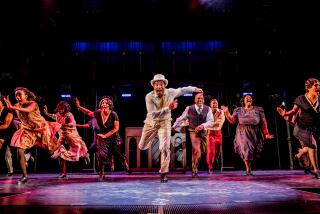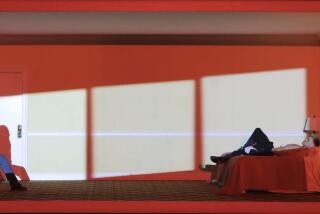A culture’s giants
America’s profile in popular music has changed immeasurably since the days when Irving Berlin and Scott Joplin ruled the nation’s taverns and bandstands. Yet the cultural factors from which ragtime found its way into history remain acute, and both composers’ works have been absorbed into the collective consciousness.
This perspective fuels “The Tin Pan Alley Rag” in director-choreographer Sha Newman’s plush production at Fullerton Civic Light Opera. Mark Saltzman’s newly revised rumination on Berlin, Joplin and the American dream has laudable aims beyond nostalgic diversion.
A hit in its 1997 Pasadena Playhouse premiere, “Tin Pan Alley Rag” has garnered praise for subsequent regional incarnations and heads for New York next year. It operates as a colloquy between parallel giants, posited against the currents of their era. After a montage of projected sheet music covers, Christina Munich’s lighting locates Berlin (Josh Prince), playing one of the two pianos that focalize Dwight Richard Odle’s setting.
Berlin and Tin Pan Alley publisher Ted Snyder (Don Lucas) are besieged by tunesmiths in the opening, “Pluggers on Parade” (written by Saltzman and musical director Brad Ellis). Delivered with zest by an ensemble bedecked in Sharell Martin’s period costumes, this amusing medley constitutes a primer in pre-World War I pop banality.
The following exposition, more informational than conversational, finds Berlin and Snyder tossing off “I Love a Piano” in authentic song-plugging manner. Joplin (Regi Davis) enters, seeking a publisher for his slavery-inspired ragtime opera “Treemonisha.” This watershed work holds the key to Saltzman’s imaginative hypothesis.
While Joplin plays the opera’s insinuating finale, “A Real Slow Drag,” he envisions its performance, the ensemble fronted by Delania Brown’s striking Treemonisha.
Thus, “Tin Pan Alley” parses the intersecting biographies, eerie parallels and ironic contrasts with beautifully rendered musical selections that eschew a revue-style “greatest hits” program.
Newman’s excellent designers and performers take on the panoramic requirements with glossy devotion. The reedy Prince works wonderfully with Davis, who recalls the young Sidney Poitier. Their keyboard miming is seamless, and their calibrated responses inform the whole.
Brown doubles as Joplin’s first wife, Freddie, their tragic union mirrored by Berlin’s short-lived marriage to Dorothy Goetz (the appealing Marcie Dodd). Lucas, Kevin Noonchester, Jeanine Robinson, Ron Kellum and Jermel Nakia have a blast in multiple roles. Melissa Haizlip, Malachi Haynes, Jada D. Odom and Dashaun Young complete a rambunctious cast.
Newman’s dances float from cakewalk to turkey trot to Fred and Ginger, without missing a step, while Ellis pulls sweeping sounds from his superb four-man pit.
The integrity of execution counters the limitations of Saltzman’s play-with-music concept. There is no intermission, which forces the compression of through-lines to their detriment, and Berlin’s valedictory feels appended.
Saltzman overuses the prescient shorthand associated with television movies, Joplin and Berlin repeatedly explaining each other’s place in history. This does not automatically translate into emotional response, nor does the admirably colorblind casting always reflect situational realities.
Such aspects don’t prohibit enjoyment of “Tin Pan Alley Rag,” but the theme-park musicology and social doxology need adjusting before moving East.
*
‘The Tin Pan Alley Rag’
Where: Plummer Auditorium, 201 E. Chapman Ave., Fullerton
When: 8 p.m. Thursdays through Saturdays; 2 p.m. Sundays; also, 7 p.m. July 25; 2 p.m. July 31
Ends: Aug. 1
Price: $20 to $42
Contact: (714) 879-1732 or (714) 879-1733
Running time: 1 hour, 45 minutes
More to Read
The biggest entertainment stories
Get our big stories about Hollywood, film, television, music, arts, culture and more right in your inbox as soon as they publish.
You may occasionally receive promotional content from the Los Angeles Times.










